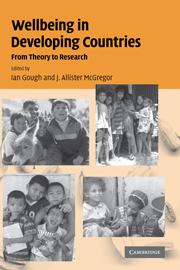Book contents
- Frontmatter
- Contents
- Figures
- Tables
- Notes on contributors
- Acronyms
- Preface
- Introduction
- 1 Theorising wellbeing in international development
- Part I Human needs and human wellbeing
- Part II Resources, agency and meaning
- Part III Quality of life and subjective wellbeing
- Conclusion: researching wellbeing
- References
- Index
1 - Theorising wellbeing in international development
Published online by Cambridge University Press: 22 September 2009
- Frontmatter
- Contents
- Figures
- Tables
- Notes on contributors
- Acronyms
- Preface
- Introduction
- 1 Theorising wellbeing in international development
- Part I Human needs and human wellbeing
- Part II Resources, agency and meaning
- Part III Quality of life and subjective wellbeing
- Conclusion: researching wellbeing
- References
- Index
Summary
Development and wellbeing
At first sight it appears incongruous to discuss wellbeing in relation to developing countries. Most often, and properly, our attention and concern is for the many people who experience suffering as a consequence of their poverty. However, there are a number of reasons why it is important to confront this apparent incongruity. The first is to acknowledge the fully rounded humanity of poor men, women and children in developing countries; recognising that they are not completely defined by their poverty, nor can they be fully understood in its terms alone. Poor people in developing countries strive to achieve wellbeing for themselves and their children. For the poorest, and in the worst instances, this will largely be a struggle to limit the extent of their illbeing and suffering. But even alongside deprivations, poor men, women and children are able to achieve some elements of what they conceive of as wellbeing, as Biswas-Diener and Diener (2001) demonstrate; without this, we would argue, their lives would be unbearable. Furthermore, it is striking that the non-poor in developing countries can often experience what appear to be high levels of life satisfaction. Wellbeing is far from an irrelevant concept in the study of international development.
From this perspective the notion of poverty (or rather poverties) has a number of limitations and the literature around it is becoming increasingly complex and to some extent muddled.
- Type
- Chapter
- Information
- Wellbeing in Developing CountriesFrom Theory to Research, pp. 3 - 44Publisher: Cambridge University PressPrint publication year: 2007
- 36
- Cited by

